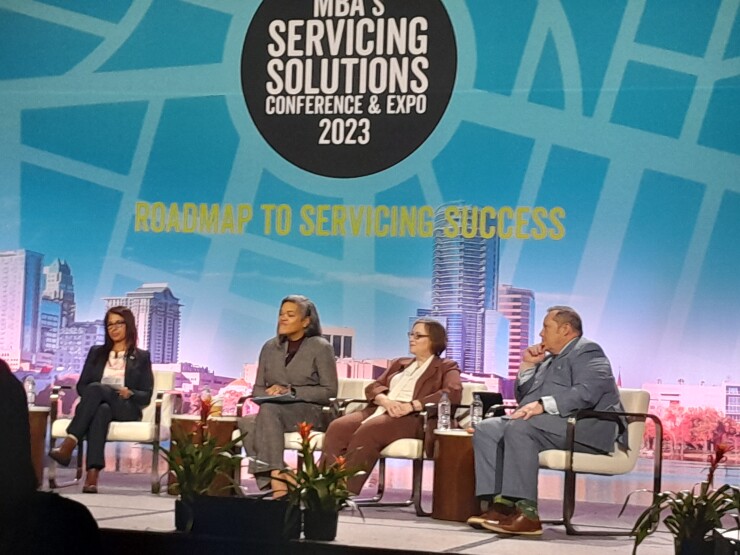Housing leaders at an industry conference on Wednesday said they are advancing some additional permanent loan-performance relief measures based on their experience with COVID-19 hardships.
Even some programs that have ended like the Department of Veteran Affairs' partial claim program and Ginnie Mae's pandemic-era Pass-Through Assistance Program may have successors, officials said at the Mortgage Bankers Association's servicing conference.
The VA partial claim, which the department used to convert missed payments to second lien obligations, was "not sustainable long-term," but ideas have arisen from feedback on it, said John Bell III, executive director of the Department of Veterans Affairs' loan guaranty program. The VA has collected comments on the strategy and other pandemic loss mitigation through an advance notice of proposed rulemaking.
"We certainly realize that partial claim was great" when it came to helping borrowers with COVID-19 hardships, Bell said.

However, the VA had some unique considerations from a "budgetary standpoint" that led to its discontinuation, he said
The department is working on another mechanism that would give distressed borrowers more relief through the extension of loan terms and rate reductions, Bell added.
Meanwhile, Ginnie Mae President Alanna McCargo reconfirmed its interest in
Because mortgage interest rates dropped soon after COVID-19's arrival in the U.S., creating a refinancing boom that returned cash to mortgage companies as old loans paid off, the PTAP was sparsely used, but knowing it was there as a backstop was a valuable source of market stability, McCargo said.
"We're in a very different environment now, so it's really important that we have on the shelf opportunities like PTAP," she added, referencing the fact that the pandemic refi boom has ended and rates, while fluctuating, have been higher than they were then.
Ginnie Mae, which backs securitizations of loans guaranteed or insured by agencies like the VA and the Federal Housing Administration, wants to continue to do what it takes to support the use of forbearance in the market because it "worked," McCargo said.
Ginnie also wants to keep expanding digital initiatives used during the pandemic to accommodate social distancing because they've proved important in other contexts as well.
"The digital collateral program really helped mitigate a lot of what happened in the pandemic, especially in the VA program," she said, noting that it was frequently used when borrowers in the military were serving overseas.
She said Ginnie Mae is still working on addressing a key challenge when it comes to digital collateral, or electronic promissory notes that establish claims to the borrower's debt, which is that they can't be commingled with paper notes in securitizations.
Regarding the commingling electronic and paper notes, there are "a lot of questions" but it is "a goal that we have," said McCargo.
An FHA official on the MBA conference panel also acknowledged that her agency has challenges with technology that could come into play as it works to modernize servicing.
"We know we're behind," said Julia Gordon, FHA commissioner and assistant secretary for housing, noting that the agency wants to account for technology modernization not only in its systems but also policies, like those around
The FHA not only recently revamped some processes for modifications and pre-foreclosure sales based on pandemic procedures, but broader reform to servicing procedures also is afoot, Gordon said. They are considering reforms regarding foreclosure timelines and penalties for missing them, which have been pain points for servicers, she said.
The Rural Housing Service also has some post-pandemic servicing changes in the works. It's collecting comments on a proposed rule that was floated in January based on its experience with
The RHS may be able to move faster on such initiatives than other agencies because it's "small and nimble," Ripley said.




